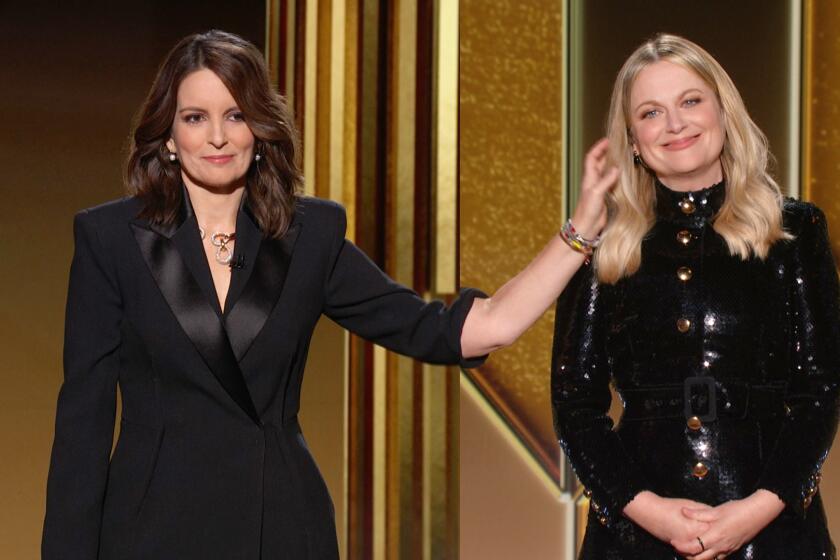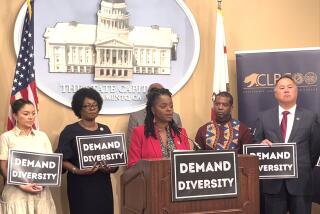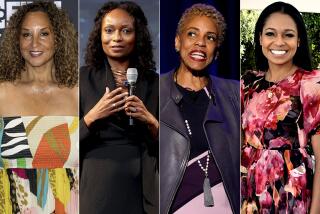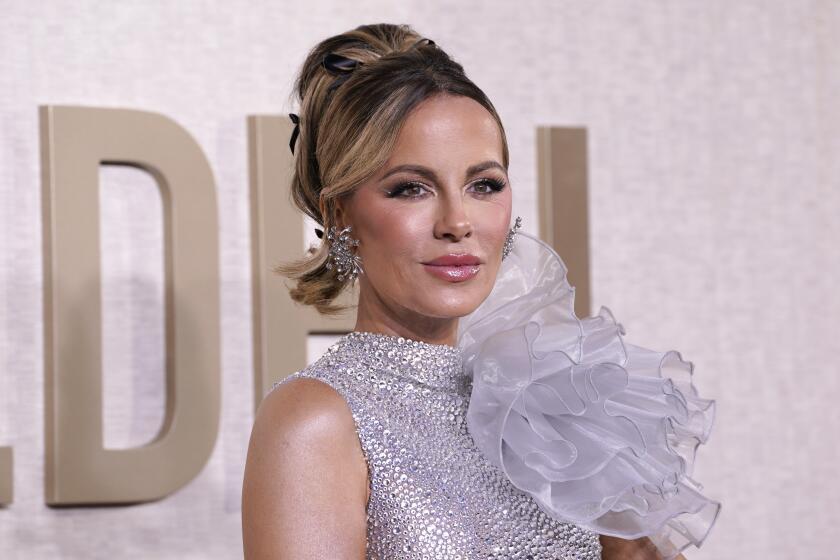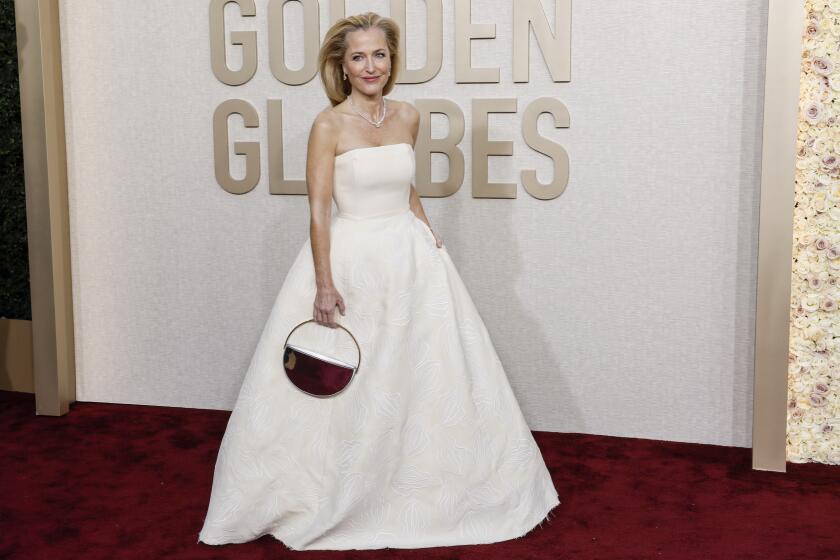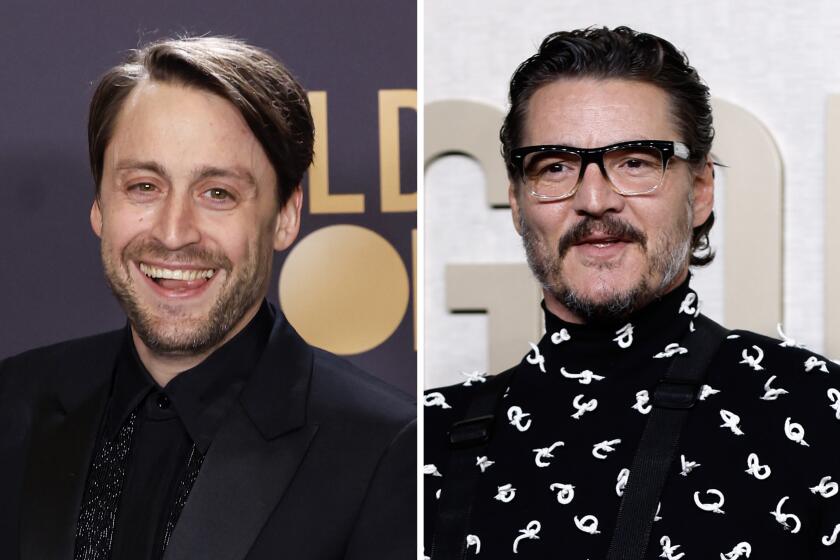As HFPA struggles to respond to mounting PR crisis, Hollywood keeps the pressure on
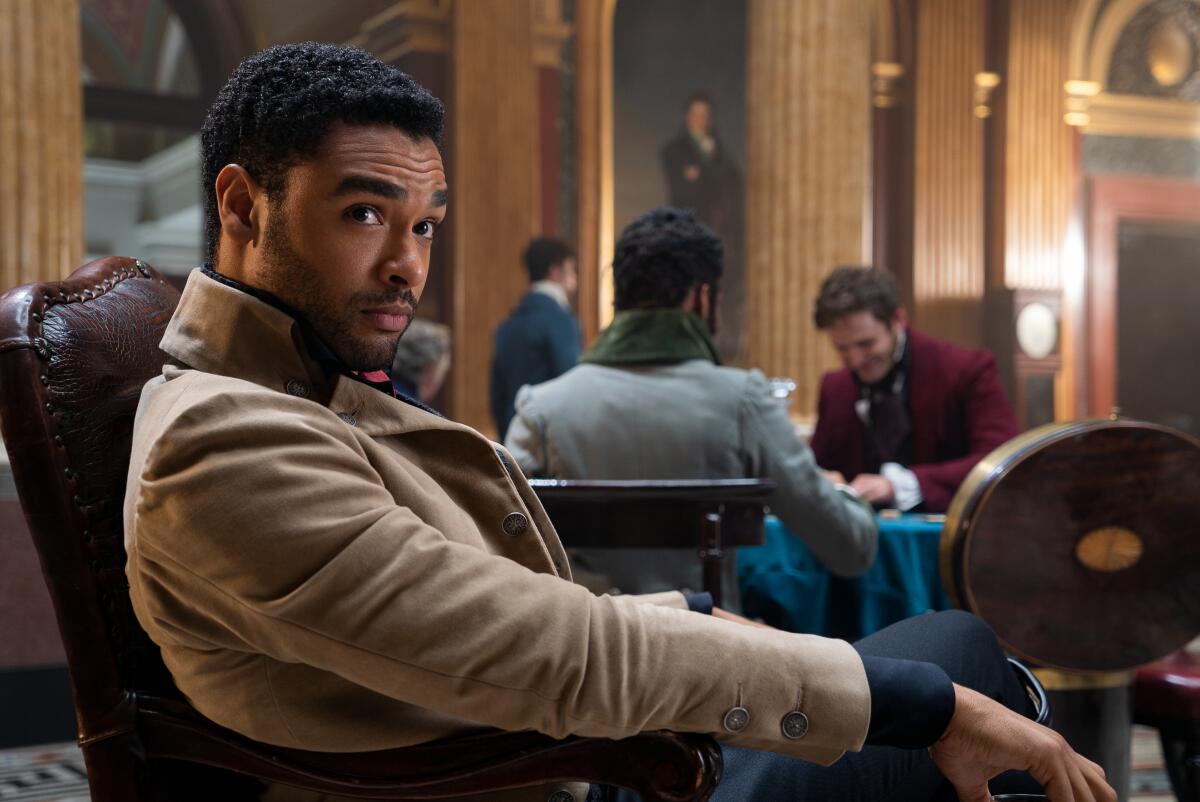
Last Thursday, a group of 46 publicists representing many of Hollywood’s biggest stars convened an emergency Zoom meeting to discuss a ballooning crisis: what to do about the Hollywood Foreign Press Assn.
Since a Feb. 21 Times investigation highlighted the fact that the 87-member group of international journalists that hands out the Golden Globes has no Black members, the HFPA has been embroiled in a controversy unlike anything seen since the #OscarsSoWhite firestorm engulfed the motion picture academy in 2017.
Powerful industry figures including TV producer Shonda Rhimes and director Ava DuVernay, as well as Time’s Up and other advocacy groups, have blasted the organization for its blind spot on issues of race, along with a range of alleged ethical lapses detailed in The Times’ reporting.
Now, with the very survival of the Globes hanging in the balance, some in Hollywood remain unconvinced that the insular and notoriously fractious group has the capacity, or perhaps even the self-awareness, to undertake the sort of transformational reforms it has vowed.
In recent days, discussions have expanded from the PR industry to talent agents and studio publicists about ways to keep the pressure on the group, whose response to date has been widely seen as tepid and tone deaf, as it works toward a self-imposed May 6 deadline to reveal its plans for change.
“They’re in a more precarious situation than they’ve ever been in,” said one publicist who attended last week’s Zoom meeting and has had extensive dealings with the HFPA over the years but was not authorized to speak publicly. “They’ve said many times they were going to change. This time, we’re not just going to take their word for it. We need action.”
Normally, publicists would be loath to bite the hand that gives out one of the industry’s most coveted, if often mocked, awards, one that has boosted the careers of many of their clients. But even as Hollywood’s PR machine has empowered the HFPA over its nearly 80-year history by providing exclusive access to their stables of stars, many have come to feel that the longstanding issues around the organization can no longer be swept under the rug.
NBCUniversal executive Craig Robinson acknowledged the network’s leadership role in spurring HFPA reforms: ‘We are using [our] influence.’
Last week’s meeting ran for nearly two hours and emotions were high, with a number of representatives sharing their clients’ experiences of the HFPA’s insensitivity around issues of race and airing their frustrations over its pattern of often overlooking Black-led projects, among other grievances with the group.
“There were some stories shared on that Zoom about blatant racism that woke everybody up,” said one longtime publicist who participated in the meeting but was not authorized to speak publicly. “There were people in tears. It became a call-to-action moment and everyone decided, ‘We are not going forward with business as usual.’”
A subsequent Zoom meeting the next day was joined by DuVernay, who spoke about the HFPA’s seeming indifference to Black-led projects such as her acclaimed 2019 Netflix miniseries about the Central Park Five, “When They See Us,” heightening the sense of urgency to issue a sharp rebuke.
On Monday, publicists from well over 100 PR agencies sent a blistering letter to the HFPA demanding the group undertake “profound and lasting change to eradicate the longstanding exclusionary ethos and pervasive practice of discriminatory behavior, unprofessionalism, ethical impropriety and alleged financial corruption endemic to the HFPA.”
Within hours of receiving the PR agencies’ letter on Monday, the HFPA, fearing a catastrophic loss of access to Hollywood talent that represents its lifeblood, released its own statement committing to expand membership from its current 87 roster and to add at least 13 Black members by next year, along with a host of diversity training and other initiatives.
“We have also started meeting with various advocacy groups and racially diverse partners to gather their input and hear their opinions on the additional reforms that need to take place,” the group said in a statement.
But if the HFPA hoped the pledge would tamp down the furor, it was quickly disabused of that notion.
On Tuesday, Rhimes wrote on Twitter that the HFPA had initially rejected a news conference for her Netflix series “Bridgerton” until the show became a hit. “And yet they STILL asked me to show up in person to present at the Globes,” she wrote. “We’re not the only ones. This is why HFPA’s house is on fire. They lit the flame w/their own ignorance.”
While many industry players have gone public with their criticism and recommendations for the HFPA since The Times’ investigation, the association’s main partners, NBC and Dick Clark Productions (dcp), have been quiet.
On Thursday, NBC weighed in on the controversy, with NBCUniversal Executive Vice President and Chief Diversity Officer Craig Robinson telling The Times in an interview, “Our perceived silence on this should not be equated with apathy or a lack of concern. We are taking these issues very seriously, and we also understand our role and the importance of our role in encouraging HFPA to make what we deem to be necessary changes — and we are using that influence.”
Behind the scenes, dcp has also been meeting regularly with the HFPA but declined to make a public statement. “We want to give them room to work,” said an individual close to the company who was not authorized to speak publicly. “There’s a lot of work to do. This work is not going to happen overnight.”
Those familiar with the HFPA’s inner workings, however, believe the sort of transformational change the group has promised will be difficult to achieve. The organization is bound by restrictive bylaws and has historically been reluctant to admit new members who might compete with existing ones for journalism work.
Meanwhile, it is unclear to what extent some of the group’s members, who hail from around the world, understand the racial dynamics in America. On Wednesday, one member, Yenny Nun, drew a direct line between recent attacks on Asian Americans and the criticism the HFPA has faced, writing on Twitter, “And now they are attacking the #hfpa where our members represent 40 countries, including many #Asians.”
Inside the association, tensions continue to mount, with some members saying that despite the HFPA’s stated commitment to transparency they have been kept in the dark about key decisions, and that emails addressed to the board and COO/General Counsel Greg Goeckner remain unanswered. During recent Zoom meetings, members said they have not been able to ask questions or receive replies directly from the board, or had to submit questions for review in advance.
On Monday, the group was asked to convene to meet with USC Marshall School professor Shaun Harper, who has been tapped to work with the group for the next five years to help manage its inclusion efforts.
According to two members, Harper described his work with the HFPA in terms of reputation recovery and emphasized transparency.
In an email, Harper told The Times, he decided to work with the association “Because I knew I could help them.”
“Moving forward, the HFPA will have a race-conscious, equity-minded strategy,” he said. “Our emphasis will not end with the addition of at least 13 Black members. But I must first learn from members and many others in the industry what the HFPA’s DEI [diversity, equity and inclusion] challenges and opportunities are, which is part of my work.”
Still, the HFPA’s pledge to add 13 least Black journalists, an apparent effort to match the share of Black people in the U.S. population, has upset some of its own members. “We’re an international group — now we have to reflect what America looks like?” said one member who was not authorized to speak publicly.
Nor has it satisfied those in Hollywood who feel that much more needs to be done to fix the HFPA.
“It’s not good enough — not even close,” said one publicist not authorized to comment who signed the letter and represents a number of major Hollywood stars. “This group needs to completely be remade. The code of ethics, the professionalism, the financial questions — all of that has to be examined. The Golden Globes is a global brand that has tremendous value, so we’re hoping that, with NBC and MRC and Dick Clark Productions, they take this seriously.”
As fierce criticisms continue to be directed at the HFPA, one current member who declined to be named for fear of reprisals acknowledged that the group has work to do to repair the trust that has been broken with the entertainment community, particularly when it comes to issues of race.
Chalking up some of the disconnect to “cultural differences,” this member said, “[HFPA members] might be talking about race in a very different way than someone in Hollywood. That said, many of us have lived here for years, if not decades, so I don’t think that’s an excuse. You really have to be sensitive to the culture you are in.”
More to Read
Inside the business of entertainment
The Wide Shot brings you news, analysis and insights on everything from streaming wars to production — and what it all means for the future.
You may occasionally receive promotional content from the Los Angeles Times.
